2018年中考英语复习七年级下册 Modules 9~12习题课件
文档属性
| 名称 | 2018年中考英语复习七年级下册 Modules 9~12习题课件 | 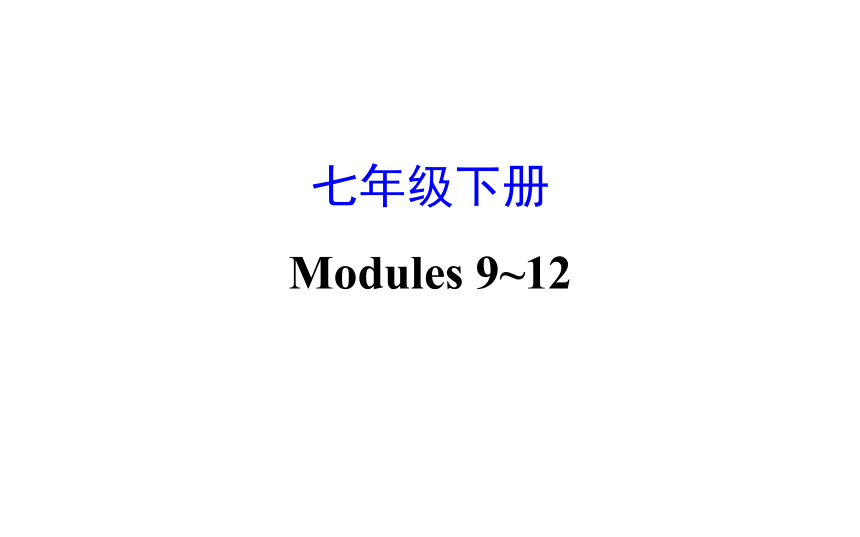 | |
| 格式 | ppt | ||
| 文件大小 | 1.1MB | ||
| 资源类型 | 教案 | ||
| 版本资源 | 外研版 | ||
| 科目 | 英语 | ||
| 更新时间 | 2018-04-03 16:15:37 | ||
图片预览

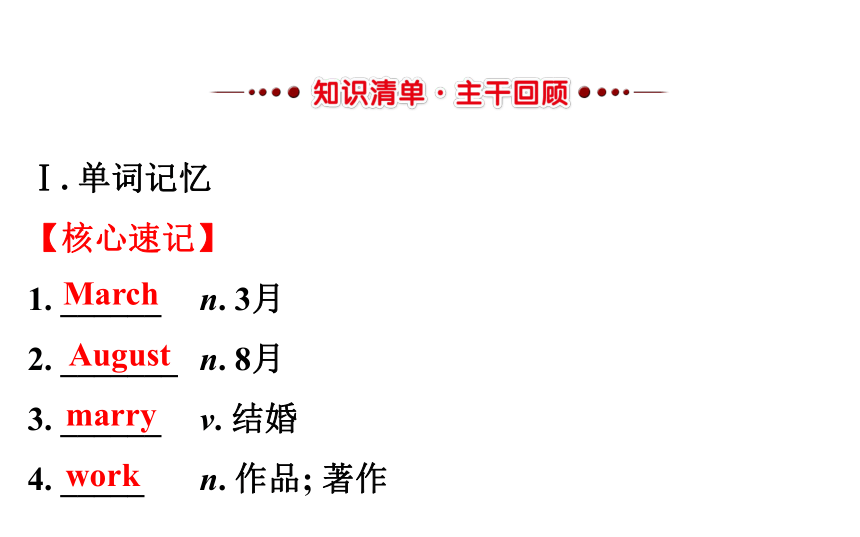
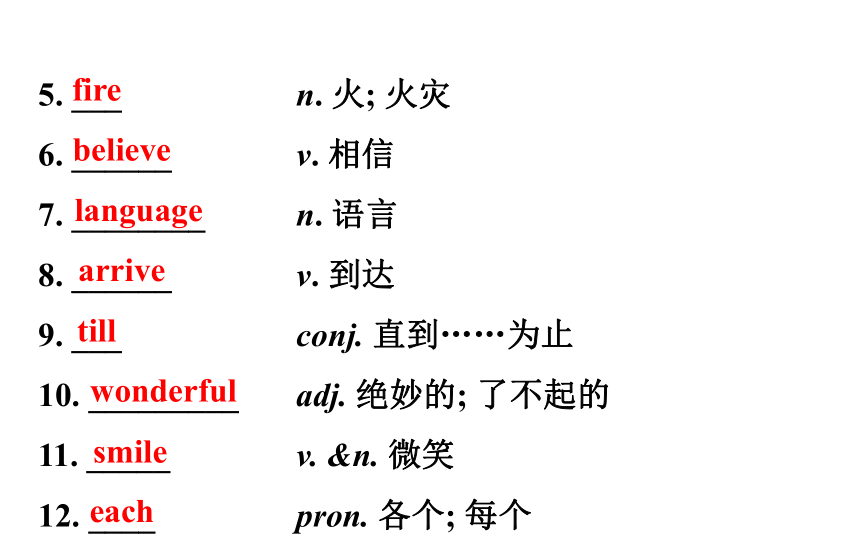
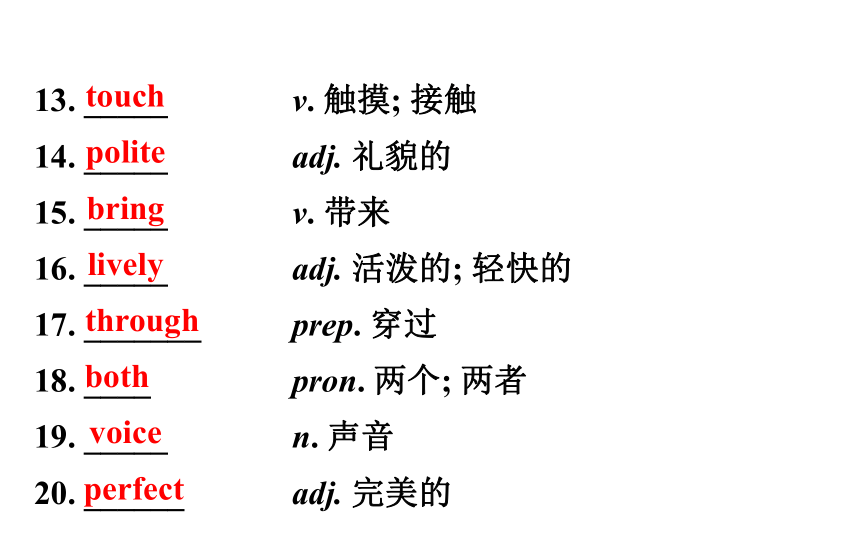
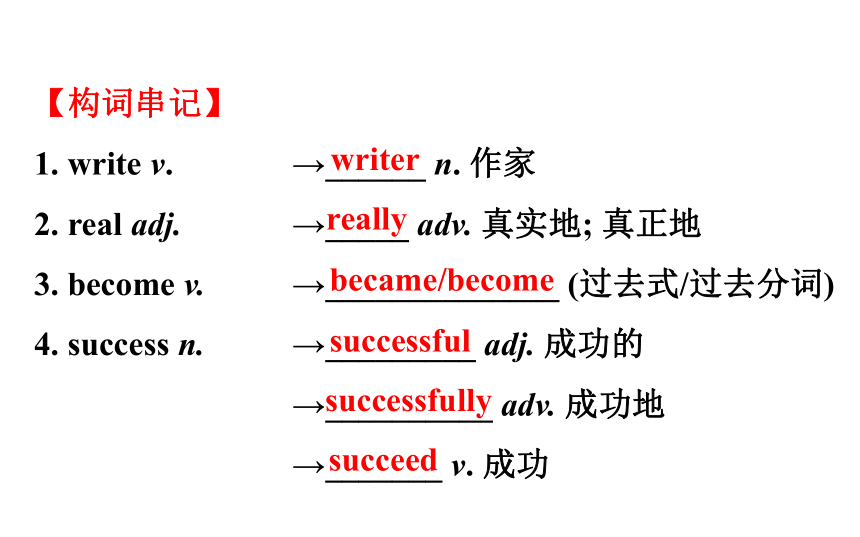
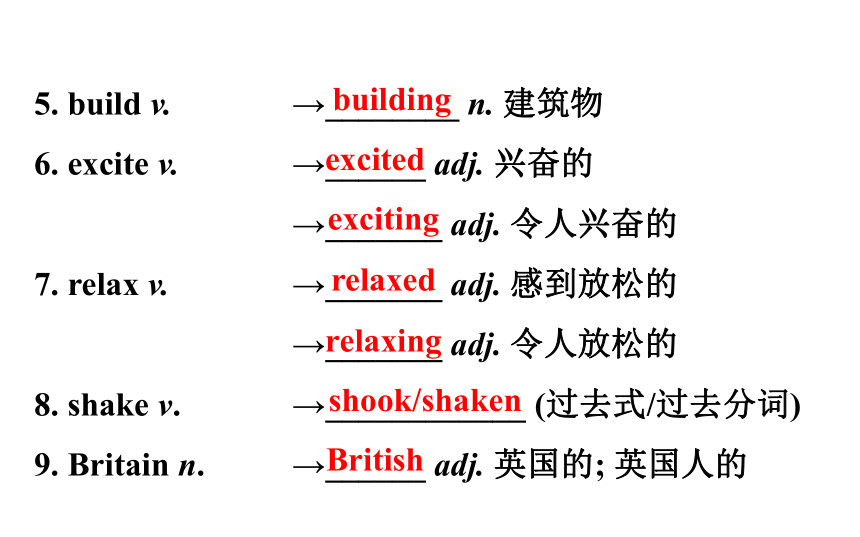
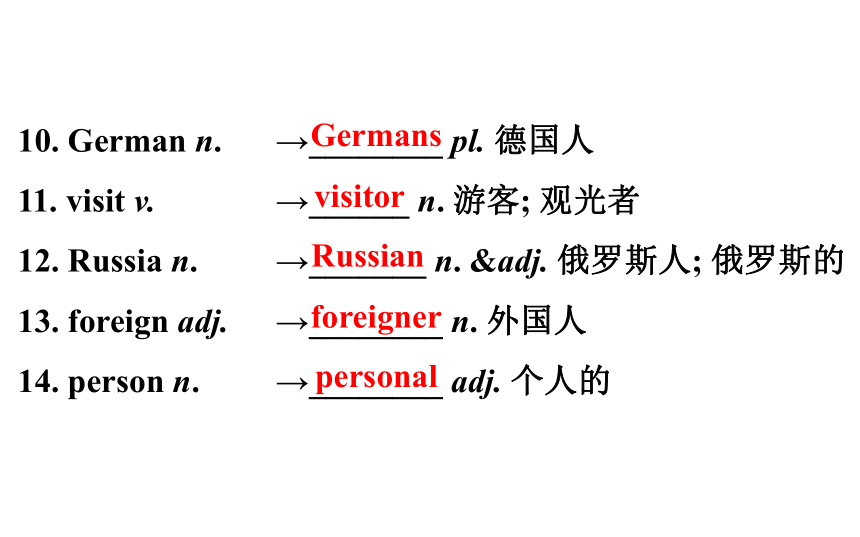
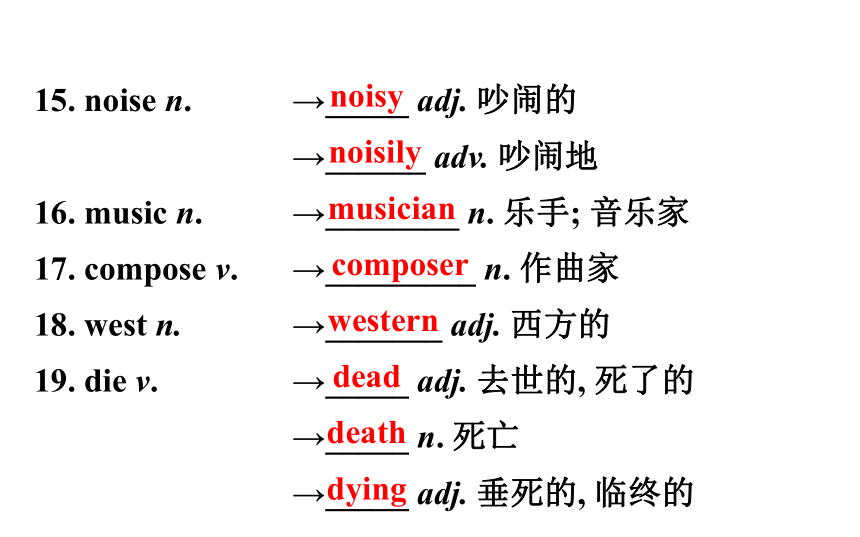
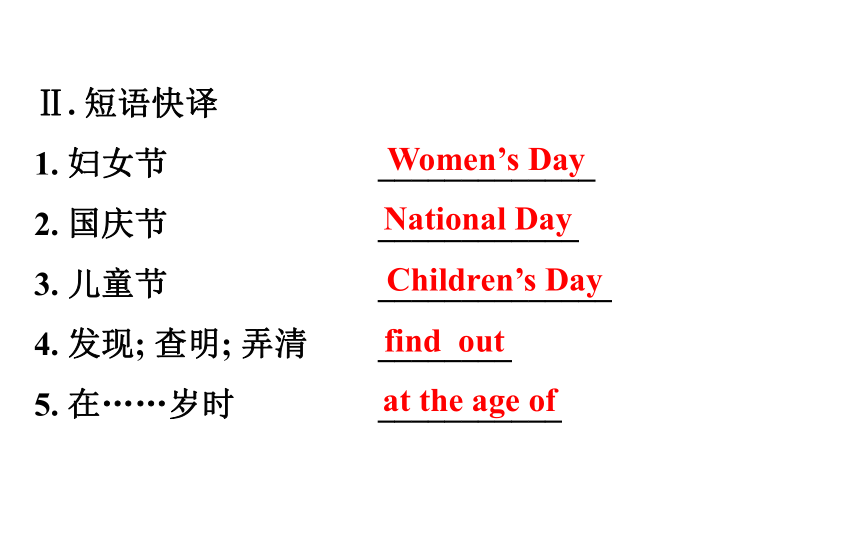
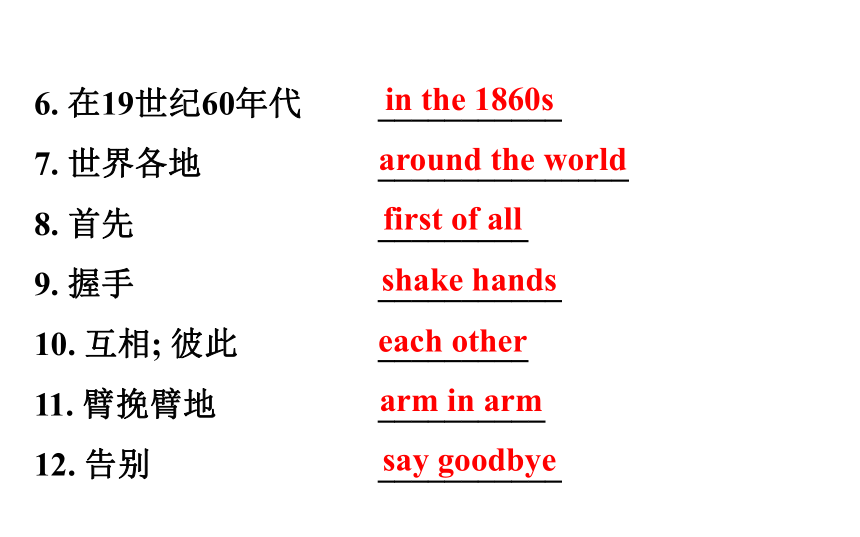
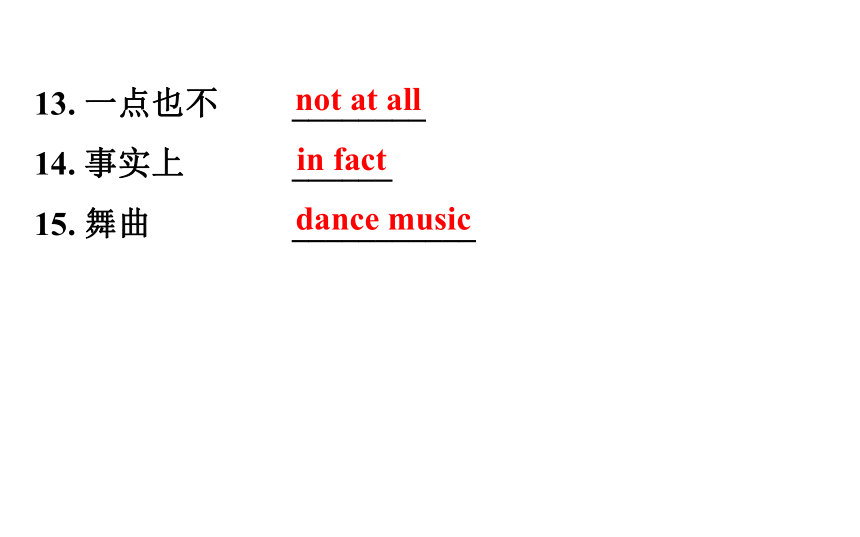
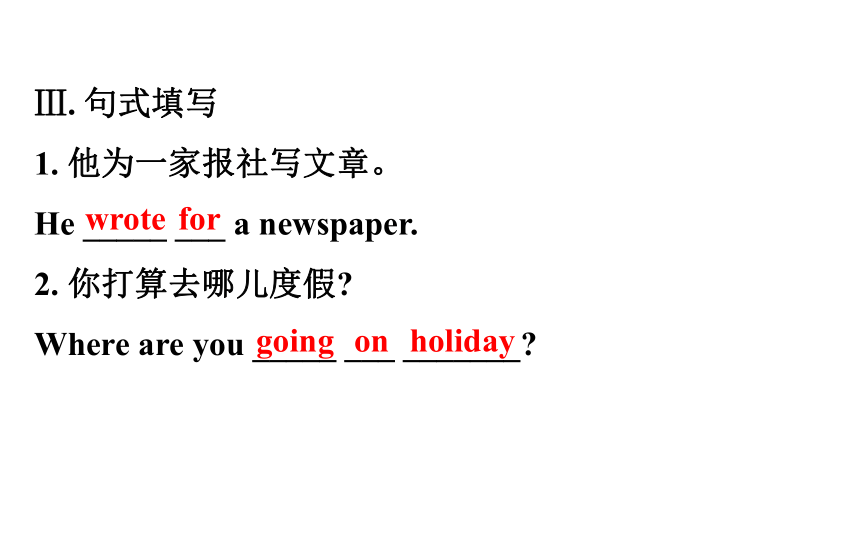
文档简介
(共130张PPT)
七年级下册
Modules 9~12
Ⅰ. 单词记忆
【核心速记】
1. ______ n. 3月
2. _______ n. 8月
3. ______ v. 结婚
4. _____ n. 作品; 著作
March
August
marry
work
5. ___ n. 火; 火灾
6. ______ v. 相信
7. ________ n. 语言
8. ______ v. 到达
9. ___ conj. 直到……为止
10. _________ adj. 绝妙的; 了不起的
11. _____ v. &n. 微笑
12. ____ pron. 各个; 每个
fire
believe
language
arrive
till
wonderful
smile
each
13. _____ v. 触摸; 接触
14. _____ adj. 礼貌的
15. _____ v. 带来
16. _____ adj. 活泼的; 轻快的
17. _______ prep. 穿过
18. ____ pron. 两个; 两者
19. _____ n. 声音
20. ______ adj. 完美的
touch
polite
bring
lively
through
both
voice
perfect
【构词串记】
1. write v. →______ n. 作家
2. real adj. →_____ adv. 真实地; 真正地
3. become v. →______________ (过去式/过去分词)
4. success n. →_________ adj. 成功的
→__________ adv. 成功地
→_______ v. 成功
writer
really
became/become
successful
successfully
succeed
5. build v. →________ n. 建筑物
6. excite v. →______ adj. 兴奋的
→_______ adj. 令人兴奋的
7. relax v. →_______ adj. 感到放松的
→_______ adj. 令人放松的
8. shake v. →____________ (过去式/过去分词)
9. Britain n. →______ adj. 英国的; 英国人的
building
excited
exciting
relaxed
relaxing
shook/shaken
British
10. German n. →________ pl. 德国人
11. visit v. →______ n. 游客; 观光者
12. Russia n. →_______ n. &adj. 俄罗斯人; 俄罗斯的
13. foreign adj. →________ n. 外国人
14. person n. →________ adj. 个人的
Germans
visitor
Russian
foreigner
personal
15. noise n. →_____ adj. 吵闹的
→______ adv. 吵闹地
16. music n. →________ n. 乐手; 音乐家
pose v. →_________ n. 作曲家
18. west n. →_______ adj. 西方的
19. die v. →_____ adj. 去世的, 死了的
→_____ n. 死亡
→_____ adj. 垂死的, 临终的
noisy
noisily
musician
composer
western
dead
death
dying
Ⅱ. 短语快译
1. 妇女节 _____________
2. 国庆节 ____________
3. 儿童节 ______________
4. 发现; 查明; 弄清 ________
5. 在……岁时 ___________
Women’s Day
National Day
Children’s Day
find out
at the age of
6. 在19世纪60年代 ___________
7. 世界各地 _______________
8. 首先 _________
9. 握手 ___________
10. 互相; 彼此 _________
11. 臂挽臂地 __________
12. 告别 ___________
in the 1860s
around the world
first of all
shake hands
each other
arm in arm
say goodbye
13. 一点也不 ________
14. 事实上 ______
15. 舞曲 ___________
not at all
in fact
dance music
Ⅲ. 句式填写
1. 他为一家报社写文章。
He _____ ___ a newspaper.
2. 你打算去哪儿度假
Where are you _____ ___ _______
wrote
for
going
on
holiday
3. 接下来, 我们的朋友们接了我们, 然后开车带我们去
他们家。
Then our friends met us and _____ __ __ their home.
4. 我们一直等到所有的灯都亮起来。
We waited ___ all the lights _____ ___.
drove
us
to
till
were
on
5. 那是因为在不同的国家人们做着不同的事情。
______ _______ people do different things in different
countries.
6. 这是西方音乐, 不是吗
____ __ Western music, ____ __
7. 这是施特劳斯的作品还是莫扎特的作品
__ ____ by Strauss __ Mozart
That’s
because
This
is
isn’t
it
Is
this
or
8. 不要站得离北美人太近!
_____ _____ ___ _____ to North Americans!
9. 多么漂亮的城市!
_____ __ ________ city!
10. 你喜欢传统的西方音乐还是流行音乐
___ you like __________ ________ music or ____ music
Don’t
stand
too
close
What
a
beautiful
Do
traditional
Western
pop
考点1 He married in 1582 and had three children.
他1582年结婚, 有3个孩子。(Module 9, P56)
marry v. 结婚
【考点对接】
①上个月这位国王把女儿嫁给了一个农民。
Last month the King _______ his daughter __ a farmer.
②去年这位年轻王子娶了一位善良的女孩。
The young prince _______ a kind girl last year.
③上周她嫁给了一位商人。
She _____________/_______ a businessman last week.
married
to
married
got married to
married
【知识归纳】marry的常用搭配
marry sb. 嫁给某人; 娶了某人
be married to sb. 与某人结婚(表示状态, 可与时间段连用)
get married to sb. 与某人结婚(表示动作, 不可与时间段连用)
marry sb. to sb. (父母把女儿)嫁给某人; (父母让儿子)娶某人
married作形容词, 意为“已婚的”; marriage作名词, 意为“婚姻”
考点2 Jenny and I arrived by plane the day before yesterday.
珍妮和我前天乘飞机到达了。(Module 10, P62)
arrive v. 到达
【考点对接】
选词填空(arrive/get /reach)
a. They ___ to their school in the afternoon on Sunday.
b. Do you know what time the train will ______ in
London
c. When we _______ the station, it began to rain.
got
arrive
reached
【词义辨析】“到达”各不同
词 汇 词 性 用 法
arrive 不及物动词 arrive in+大地方
arrive at+小地方
reach 及物动词 reach+地方
get to 动词词组 get to+地方
“到达北京”三种表达方式如下图所示:
①We arrived at the station one hour early.
我们提前一个小时到达车站。
②They will arrive in Paris next Monday.
他们将于下周一到达巴黎。
③How can we get to the airport
我们怎样才能到达机场
④They reached the top of the mountain.
他们到达了山顶。
【易错警示】
当get to, arrive in/at后接home, here或there等副词时, 要省略介词to, in或at。
【拓展训练】
(2015·哈尔滨中考)It was such a long way that they didn’t ______the hotel until it became dark.
A. reach B. arrive C. get
【解析】选A。考查动词用法辨析。句意: 路那么远, 直到天黑了他们才到达旅馆。作“到达”时, reach直接跟目的地。arrive和get须用介词连接目的地, 但其后为副词时, 介词须省略。由题干可知选A。
考点3 We waited till all the lights were on.
我们一直等到所有的灯亮。(Module 10, P62)
till conj. 直到……为止
【考点对接】
①(2017·益阳中考)I didn’t realize he was a famous scientist______you told me.
A. until B. because C. since
【解析】选A。考查连词辨析。句意: 直到你告诉我我才意识到他是一名著名的科学家。固定搭配not. . . until直到……才……。故选A。
②孩子们不到天黑不回家。
The children ________home _______ it is dark.
won’t go
till/until
【知识归纳】
(1)until=till表示动作、状态的持续, 强调“直到……为止”, 或强调某个动作或状态一直持续到另一个动作或状态出现。后接具体时刻/时间短语(yesterday/next weekend)或从句, 常与表示延续性动作的动词连用。
They worked until/till six o’clock.
他们一直工作到六点钟。
(2)not. . . till/until表示“到……为止; 直到……才”, 常与表示瞬间性动作的动词连用。主句中动词为非延续性动词。例如:
He didn’t go to bed until/till eleven last night.
昨天晚上他直到十一点才上床睡觉。
【易错警示】
till/until引导时间状语从句时, 从句中常用一般现在时代替一般将来时; 用一般过去时代替过去将来时。
考点4 In the US some people shake hands, and some kiss or hug each other. 在美国一些人握手, 一些人亲吻或者拥抱彼此。(Module 11, P66)
each pron. 各个; 每个
【考点对接】
①(2016·武汉中考)—There’re four bedrooms in the house, ______with its own shower.
—That’s what I want. I’ve got a few kids.
A. either B. neither C. each D. none
【解析】选C。考查不定代词。句意: ——房子里有4个卧室, 每个卧室都有自己的淋浴室。——那正是我想要的。(因为)我有几个孩子。either两者中任何一个; neither两者都不; each每一个; none三者或三者以上都不。只有C项符合。
②(2016·黔西南州中考)There are many trees on both sides of the street.
A. every side B. all sides
C. each sides D. each side
【解析】选D。考查不定代词。every+名词单数, 指三者或三者以上的“每个”; all+名词复数, 指三者或三者以上的“所有的”; each+名词单数, 指两者或两者以上的“每个”。street有两边, each side表示两边的“任何一边”, 故选D。
③We have English classes______day, Monday, Wednesday and Friday.
A. each other B. every other
C. one D. every
【解析】选B。考查不定代词。句意: 我们每隔一天就有英语课, 周一、周三和周五。each other“彼此, 互相”, 该短语只能单独使用, 不能作定语修饰day。one day“有一天/总有一天”, 也是单独作时间状语。every other+名词单数, 意思是“每隔一……”故选B。
【词义辨析】each和every的辨析
each adj.
pron. each侧重从个体方面考虑 既可单独使用, 也可后接名词, 还可后接of短语 指两者或两者以上的“每个”
every adj. 侧重从总体上考虑 后面必须接名词, 既不能单独使用也不能后接of短语 指三者或三者以上的“每个”
①Every student in our school works hard.
我们学校的每个学生都很用功。
②Each of the students has seen it.
每个学生都见过它。(不能用every)
考点5 I like both.
(两种音乐)我都喜欢。(Module 12, P72)
both pron. 两个; 两者
【考点对接】
①(2016·烟台中考)这两道物理题都不难, 王华很轻松地就做出来了。
_______ __ the physics problems is difficult. Wang Hua worked them out easily.
Neither
of
②(2017·益阳中考)—Which of the two subjects do you like, P. E. or music
—______. They are really interesting.
A. Neither B. Both C. None
【解析】选B。考查不定代词辨析。句意: ——你喜欢两门课程中的哪一门, 体育还是音乐 ——都喜欢。它们非常有趣。both都(两者); neither都不(两者); none都不(三者或三者以上)。根据上文中the two subjects可知提及的是两个事物, 结合下文“它们非常有趣”可知上述两门课程对方都喜欢。故选B。
③(2017·上海中考)______knowledge and experience are important to finish that task.
A. Either B. Neither
C. None D. Both
【解析】选D。考查连词词义辨析。句意: 对于完成那项任务, 知识和经验都很重要。由语境可知, 本句是肯定句, 由knowledge and experience可知, 这是两者之间的关系。both. . . and. . . 意为“……和……两个都”, 连接两个主语时, 谓语动词应用复数形式。选项中的neither连接两个主语时须与nor连用。either, none不与and连用。故选D。
【词义辨析】both和all的辨析
共同点 通常位于be动词、助动词或情态动词之后, 行为动词之前
与not连用时, 表示部分否定
不同点 (1)both指“两者都”, 反义词为neither
(2)both. . . and. . . 连接两个并列主语时, 谓语动词用复数形式
(3)both. . . and. . . 的否定结构为neither. . . nor. . .
all指“三者或三者以上都……”, 反义词为none
①We all believe the story to be true.
我们都相信这个故事是真的。
②Both of us are not teachers.
我们俩并不都是教师。(部分否定)
③Neither of us is a doctor.
我们俩都不是医生。
④Both he and his brother are good at English.
他和他哥哥都擅长英语。
⑤Neither Dad nor Mum is at home today.
今天爸妈都不在家。
⑥All my friends can not swim.
我的朋友们并不都会游泳。
⑦None of my friends can swim.
我所有的朋友都不会游泳。
【要点备选】
考点1 But he took the name Mark Twain and became very famous in the 1860s.
但是他取名叫马克·吐温, 在19世纪60年代就变得很出名了。(Module 9, P54)
in the 1860s在19世纪60年代
【考点对接】
①(2017·南京中考)Over 10, 000 runners joined a half and a mini marathons in Xianlin, Nanjing______May 7, 2017.
A. in B. on C. at D. by
【解析】选B。考查介词辨析。句意: 在2017年5月7日, 一万多名运动员加入了南京仙林半程马拉松比赛。在具体某一天前用介词on。故选B。
②(2016·安顺中考)Nowadays, more and more people have taken an interest______watching Running Man ______Friday evening.
A. in; in B. at; on C. in; on D. for; in
【解析】选C。考查介词用法。take an interest in对……感兴趣。在具体某一天的晚上用介词on。故选C。
【妙辨异同】时间介词in / on / at的区别
in 表示在某年、某季节、某月、某周和某段时间; 所指时间范围大 in the morning (afternoon, evening)
on 指在具体某一天或具体某一天的上午、下午、晚上 on Monday, on Sunday afternoon, on July 1, 1999
at 一般表示具体时刻 at eight o’clock
【易错警示】
在英语中, 如果时间名词被this, last, next, tomorrow, yesterday等修饰, 前面不需要任何介词。
考点2 He left school and began work at the age of twelve. 他12岁时离开学校开始工作。(Module 9, P54)
at the age of 在……岁时
【考点对接】
①王丽在六岁的时候会弹钢琴。
Wang Li could play the piano ______________.
②The artist went to Paris when he was 30. (改为同义
句)
The artist went to Paris __ ___ ___ __ 30.
at the age of six
at
the
age
of
【知识归纳】
at the age of意为“在……岁时”, 后面直接接年龄, 相当于“at+年龄”或者when引导的时间状语从句。例如:
I could help my mother do some housework at the age of six/at six/when I was six years old.
我六岁时就可以帮我妈妈做些家务了。
考点3 He became a successful actor and began to write plays. 他成为一名成功的演员, 并开始写剧本。(Module 9, P56)
successful adj. 成功的
【考点对接】①用success的适当形式填空
a. She is a _________ businesswoman.
b. We were surprised at his _______.
c. If this work ________, you and I can do things together.
d. We drove __________back to the centre of the city.
successful
success
succeeds
successfully
②(2017·咸宁中考)—Zheng He was a Ming dynasty ______that we Chinese people are proud of.
—I agree with you. He even succeeded______sailing to the east coast of Africa.
A. tourist; to B. philosopher; in
C. inventor; to D. explorer; in
【解析】选D。考查名词辨析和固定短语的用法。句意: ——郑和是一位我们中国人都引以为豪的明朝探险家。——我同意你的看法。他甚至成功地航行到非洲的东海岸。由“sailing to the east coast of Africa”, 结合历史常识可知, 第一个空格用explorer, 意为“探险家”。succeed in doing sth. 意为“在做……方面取得成功”。故选D。
【知识归纳】与“成功”有关的词汇
success n. 成功 ①表示抽象意义的“成功”, 是不可数名词;
②表示具体意义的“成功的人或事”, 是可数名词。
have success in. . . 在某方面取得成功
succeed v. 成功 succeed in doing sth. “成功做某事”
successful adj.
成功的 是由名词success+-ful构成的形容词
be successful in doing sth.
“成功地做某事”
successfully adv.
成功地 是由形容词successful+-ly构成的副词
①Failure is the mother of success. 失败是成功之母。
②He is a successful businessman. 他是一个成功的商人。
③The thing goes successfully. 这件事进行得很成功。
考点4 William Shakespeare died at the age of fifty-two. 威廉·莎士比亚在52岁时去世。(Module 9, P56)
die v. 死; 去世
【考点对接】
①用die, dead, death, die of, die from的适当形式填空
a. His dog _____________for two days.
b. His son’s _____ was a great blow to him.
c. The child was afraid of the _____ cat.
d. Many villagers ________snake bites.
e. The animals ______starvation(饥饿)in the snow.
has been dead
death
dead
die from
died of
②(2016·郴州中考)Yang Jiang, a famous female writer, ______for about a month so far.
A. died B. has been dead C. has been died
【解析】选B。句意: 杨绛, 一位著名的女作家, 到目前为止已经去世大约一个月了。die去世, 为短暂性动词, 不能与时间段连用, 表延续性用be dead。故选B。
【知识归纳】
(1)die的用法
①die是动词, 意为“死, 去世”, 表示生命的结束, 是不及物动词, 不能用于被动语态; 强调动作, 是瞬间动词, 不能与表示一段时间的状语连用。
His father died last week. 他父亲上周去世了。
②die的名词是death; die的形容词是dead, 意为“死的”; dying意为“奄奄一息的, 濒临死亡的”, 也是形容词。
She cried out after knowing the songwriter Yan Su’s death. 在得知词作家阎肃去世的消息后, 她放声大哭。
He found a dead bird in the garden.
他在花园里发现了一只死去的鸟。
The dying man was saved by a kind-hearted policeman.
这个奄奄一息的人被一位好心的警察救了。
(2)die的两种搭配
die of 因……
而死 死因存在于自身 主要指情感、冻、饿、疾病、衰老等自身的原因
die from 由于……
而死 死因是由外界环境造成的 主要指事故等方面的外部原因
考点5 I was so excited!
我是如此兴奋!(Module 10, P60)
excited adj. 激动的; 兴奋的
【考点对接】用excited和exciting填空
①John was so ______ at the good news that he could
hardly say a word.
excited
②(2016·恩施中考)The______show on Zhejiang TV, Running Man, makes lots of people______.
A. interesting; relaxing
B. interesting; relaxed
C. interested; relaxed
【解析】选B。考查形容词辨析。句意: 浙江卫视的有趣的节目《奔跑吧兄弟》让许多人感到放松。interesting/relaxing指事物本身有趣/令人放松; interested/relaxed指人感到有趣/放松。故选B。
【妙辨异同】excited和exciting的辨析
excited
(adj. ) 兴奋的 指人对……感到兴奋 主语常是“人”
exciting
(adj. ) 令人兴奋的;
使人激动的 指事、物本身令人兴奋、激动 修饰“事, 物”
①Are you excited about going to Beijing
你对去北京感到兴奋吗
②He told us an exciting story yesterday.
他昨天给我们讲了一个使人激动的故事。
【拓展延伸】有类似用法的形容词还有:
interested/interesting bored/boring
surprised/surprising tired/tiring
考点6 In Greece, it’s not at all polite!
在希腊, 这一点也不礼貌。(Module 11, P68)
not at all一点也不
【考点对接】
①——谢谢你帮助我。
——别客气。
—Thanks for helping me.
—________.
Not at all
②——英语难学吗
——它一点也不难。
—Is it difficult to study English
—___________________.
③我妈妈根本不喜欢看电视。
My mother _______ like watching TV _____.
It’s not difficult at all
doesn’t
at all
【妙辨异同】not at all和not. . . at all的辨析
not. . . at all 意为“根本不……”, 用在句子中, not和be动词或助动词构成否定句
not at all 用于回答感谢, 意为“不用谢; 不客气”
用于回答道歉, 意为“没关系”
①She doesn’t like it at all. 她根本不喜欢它。
②—Thank you very much. 非常感谢你。
—Not at all. 不用谢。
③—I’m sorry I’m late.
对不起, 我迟到了。
—Oh, not at all, do come in.
噢, 没关系, 请进来。
考点7 lively adj. 活泼的; 轻快的(Module 12, P72)
【考点对接】(1)选词填空(alive/live/living/lively)
①My mother wanted to keep the fish ____.
②That pig in Wenchuan earthquake is still _____.
③I hope there’ll be _____ and interesting discussion
about the subject.
④The cat is playing with a ___ mouse.
alive
living
lively
live
(2)(2017·常州模拟)We are covering these______ girls’ wonderful performances______.
A. alive; live B. lively; alive
C. lively; live D. alive; living
【解析】选C。考查副词或形容词辨析。句意: 我们正在现场直播这些活泼女孩的精彩表演。由句子结构得知, 第一个空应填形容词, 修饰名词girls, 第二个空应填一个副词, 修饰谓语动词。alive活着的; lively活泼的; live副词, 现场直播地; living活的, 活着的。由句意知第一个空应填lively, 第二个空应填live, 故选C。
【妙辨异同】alive, live, living, lively辨析
alive 活的、有生命的 没有比较级和最高级, 可用作表语和后置定语, 修饰人或动物, 不能用来修饰植物
live 有生命的; 活的; 现场直播的 通常只作前置定语, 且一般修饰动物
living 活的、有生命的 可用作表语和定语, 修饰人或物
lively 活泼的、快活的、生动的 可用作定语、表语和宾语补足语, 修饰人或物
①Young children are usually lively.
小孩子们通常是活泼的。
②This is a live/living fish. =This is a fish alive.
这是一条活鱼。
③The fish is still alive. 那条鱼还活着。
④The living are more important to us than the dead.
活着的人对我们来说比死去的人更重要。
【易错警示】
只有living前加the才可表示“活着的人”, 作主语时, 视作复数。
考点8 This is Western music, isn’t it
这是西方音乐, 不是吗 (Module 12, P72)
反意疑问句
【考点对接】
①(2017·鄂州中考)—He didn’t go to school late yesterday, did he
—______, though it rained hard yesterday.
A. No, he didn’t B. Yes, he didn’t
C. Yes, he did D. No, he did
【解析】选A。考查反意疑问句答语。当陈述部分为否定式, 反意疑问句部分用肯定式提问时, 回答yes或no与汉语正好相反。回答的yes要译成“不”, no要译成“是”。句意: ——昨天他上学没有迟到对吗 ———是的, 他没有迟到, 尽管昨天雨下得很大。故选A。
②(2017·呼和浩特中考)—He doesn’t speak English or Japanese, ______
—______. He speaks Chinese.
A. does he; Yes, he doesn’t
B. doesn’t he; No, he does
C. does he; No, he doesn’t
D. does he; Yes, he does
【解析】选C。考查反意疑问句。反意疑问句句式特点: 当陈述部分为肯定式, 反意疑问句为否定式; 当陈述部分为否定式, 反意疑问句为肯定式。对反意疑问句的回答, 无论问题的提法如何, 如果事实是肯定的, 就用yes, 事实是否定的, 就要用no。故选C。
【知识归纳】
(1)反意疑问句通常由前后两部分构成, 其结构为“肯定陈述句+简略否定问句”或“否定陈述句+简略肯定问句”。
(2)若陈述句中含有hardly, never, few, little, nothing, nobody等表示否定意义的词, 简略问句要用肯定形式。
She likes Beijing Opera, doesn’t she
Tom has few friends here, has/does he
【拓展延伸】几种特殊形式
(1)陈述部分的主语是I, 疑问部分要用aren’t I。例如: I’m as tall as your sister, aren’t I
我跟你的姐姐一样高, 对吗
(2)省去主语的祈使句的反意疑问句, 疑问部分用will you。例如: Don’t do that again, will you
别再那样做了, 好吗
【易错警示】
Let’s开头的祈使句, 后用shall we。例如: Let’s go and listen to music, shall we
让我们一起去听音乐, 好吗
(3)陈述部分是“there be”结构的肯定形式, 疑问部分用be not there。There is something wrong with your watch, isn’t there 你的表有问题, 对不对
(4)否定前缀不能视为否定词, 其反意疑问句仍用否定形式。
It’s unfair, isn’t it 这不公平, 对吗
考点9 —Is this by Strauss or Mozart
这是施特劳斯的作品还是莫扎特的作品
—I’m not sure. . . 我不太确定……(Module 12, P72)
选择疑问句及其回答
【考点对接】
①(2016·丹东中考)—Our mother’s birthday is coming. Do you want to buy a wallet or a scarf for her
—______. She just got a beautiful scarf last week.
A. Yes, I do B. No, I don’t
C. A scarf D. A wallet
【解析】选D。考查情景交际。句意: ——我们妈妈的生日马上到了。你想给她买个钱包还是围巾 ——钱包吧。上周她刚刚收到一条漂亮的围巾。对于选择疑问句, 不能用yes或no来回答, 故排除A和B。根据答语中收到一条围巾, 不可能再买围巾, 只能是钱包。故选D。
②——今天上午你上网还是看电视
——上网。
—Will you ____________________this morning
—I will go online.
go online or watch TV
【知识归纳】
选择疑问句表示提供两种或两种以上的情况, 要求对方在所提供的范围、对象内选择。在所提供的最后一个备选对象前面用表示选择关系的并列连词or。
(1)“一般疑问句+or+另一个备选对象”。
—Is your brother tall or short 你的弟弟高还是矮
—He is tall. 他很高。
(2)“特殊疑问句, 选择对象+or+另一个备选对象”。
—Which would you like, tea or coffee 你想要哪样, 是茶还是咖啡
—Tea. 茶。
(3)回答选择疑问句时, 一般用一个完整的陈述句或其简略形式, 不能用Yes/No来回答。
考点10 This music makes me feel fun.
这首音乐让我感到很有趣。(Revision module B, P80)
feel v. 感觉; 觉得
【考点对接】
①我感觉不舒服, 什么也不想吃。
I feel terrible and I don’t _____________anything.
②你们能来看望我, 我感到很高兴。
I _________because you came to see me.
③丝绸摸起来很柔软平滑。
Silk ____soft and smooth.
feel like eating
felt happy
feels
【知识归纳】feel的用法
系动词 人作主语, 后接形容词作表语, “感觉; 觉得”
物作主语, 后接形容词作表语, “摸起来……”
实义动词 feel sb. do/doing sth. 感觉某人做了/正在做某事
feel like doing sth. 想要做某事
相当于think, 意为“觉得, 认为”, 后接从句或用于“feel it+宾语补足语+to do sth. ”结构
①I don’t feel very well today.
我今天感觉不太舒服。
②Your hand feels cold.
你的手摸起来很凉。
③He felt his health improving.
他感到自己的健康状况正在好转。
④I don’t feel like walking very much today.
我今天不太想散步。
⑤I feel it hard to solve the problem by myself.
我认为我自己解决这个问题很难。
语法点: 一般过去时
——见语法专项部分P295
考点1: 一般过去时态中动词的表现形式即过去式
考点2: 一般过去时的用法, 强调动作发生在过去, 或状态存在于过去
【强化训练】
单项选择
1. (2017·重庆中考·B卷)John and I______to visit his grandparents last Sunday afternoon.
go B. went C. will go
【解析】选B。考查动词的时态。根据句中的时间状语last Sunday afternoon可知为一般过去时态, 故选B。
2. (2016·武汉中考)—Sorry, Tom. I can’t find the book you______me.
—It’s OK. I don’t need it any more.
A. lend B. have lent
C. will lend D. lent
【解析】选D。考查时态。句意: ——对不起, 汤姆。我找不到你借给我的书了。——没关系, 我再也不需要它了。表示以前借出的, 用一般过去时, 故选D。
3. (2016·无锡中考)My mind wasn’t on what he was saying so I’m afraid I______half of it.
A. missed B. was missing
C. will miss D. would miss
【解析】选A。考查时态。句意: 我的心思不在他刚才所说的内容上, 所以我担心我刚才错过了一半的内容。表示刚才错过了, 用一般过去时, 故选A。
4. (2016·呼和浩特中考)—I have to be off right now.
—What a pity! I______you could stay a little longer with us.
A. thought B. am thinking
C. think D. was thinking
【解析】选A。考查时态。句意: ——现在我不得不走了。——多么遗憾!我原以为你可以和我们待在一起的时间会更长一点。could在此是can的过去式, 从句用一般过去时, 主句也用一般过去时。
5. (2017·上海中考)Several journalists______the lawyer about the international case an hour ago.
A. interview B. interviewed
C. will interview D. had interviewed
【解析】选B。考查动词的时态。句意: 一小时前, 几个游客______律师关于这个国际案例的事情。由表过去的时间状语an hour ago可知, 本句应用一般过去时态。故选B。
Ⅰ. 用所给词的适当形式填空
1. He _____ (live)in Beijing two years ago.
2. The cat ___(eat)a bird last night.
3. We ____(have)a party last Halloween.
4. Nancy ______(pick)oranges on the farm last week.
5. I _____(make)a model ship with Mike yesterday.
lived
ate
had
picked
made
6. They ______(play)chess in the classroom last PE lesson.
7. My mother _______(cook)nice food last Spring Festival.
8. The girls ____(sing)and _______(dance)at the party.
played
cooked
sang
danced
9. The mobile phone ____(be)on the sofa yesterday
evening.
10. We ______(drink)a lot of water after the football
match yesterday.
was
drank
Ⅱ. 写出下列动词的过去式
1. am/is—____ 2. are—_____
3. do—___ 4. see—____
5. say—____ 6. give—____
7. get—___ 8. go—_____
9. come—_____ 10. sweep—_____
was
were
did
saw
said
gave
got
went
came
swept
11. walk—_______ 12. take—____
13. run—____ 14. sing—____
15. put—___ 16. make—_____
17. read—____ 18. write—_____
19. draw—_____ 20. speak—_____
21. fly—____ 22. ride—____
23. hurry—_______ 24. eat—___
walked
took
ran
sang
put
made
read
wrote
drew
spoke
flew
rode
hurried
ate
七年级下册
Modules 9~12
Ⅰ. 单词记忆
【核心速记】
1. ______ n. 3月
2. _______ n. 8月
3. ______ v. 结婚
4. _____ n. 作品; 著作
March
August
marry
work
5. ___ n. 火; 火灾
6. ______ v. 相信
7. ________ n. 语言
8. ______ v. 到达
9. ___ conj. 直到……为止
10. _________ adj. 绝妙的; 了不起的
11. _____ v. &n. 微笑
12. ____ pron. 各个; 每个
fire
believe
language
arrive
till
wonderful
smile
each
13. _____ v. 触摸; 接触
14. _____ adj. 礼貌的
15. _____ v. 带来
16. _____ adj. 活泼的; 轻快的
17. _______ prep. 穿过
18. ____ pron. 两个; 两者
19. _____ n. 声音
20. ______ adj. 完美的
touch
polite
bring
lively
through
both
voice
perfect
【构词串记】
1. write v. →______ n. 作家
2. real adj. →_____ adv. 真实地; 真正地
3. become v. →______________ (过去式/过去分词)
4. success n. →_________ adj. 成功的
→__________ adv. 成功地
→_______ v. 成功
writer
really
became/become
successful
successfully
succeed
5. build v. →________ n. 建筑物
6. excite v. →______ adj. 兴奋的
→_______ adj. 令人兴奋的
7. relax v. →_______ adj. 感到放松的
→_______ adj. 令人放松的
8. shake v. →____________ (过去式/过去分词)
9. Britain n. →______ adj. 英国的; 英国人的
building
excited
exciting
relaxed
relaxing
shook/shaken
British
10. German n. →________ pl. 德国人
11. visit v. →______ n. 游客; 观光者
12. Russia n. →_______ n. &adj. 俄罗斯人; 俄罗斯的
13. foreign adj. →________ n. 外国人
14. person n. →________ adj. 个人的
Germans
visitor
Russian
foreigner
personal
15. noise n. →_____ adj. 吵闹的
→______ adv. 吵闹地
16. music n. →________ n. 乐手; 音乐家
pose v. →_________ n. 作曲家
18. west n. →_______ adj. 西方的
19. die v. →_____ adj. 去世的, 死了的
→_____ n. 死亡
→_____ adj. 垂死的, 临终的
noisy
noisily
musician
composer
western
dead
death
dying
Ⅱ. 短语快译
1. 妇女节 _____________
2. 国庆节 ____________
3. 儿童节 ______________
4. 发现; 查明; 弄清 ________
5. 在……岁时 ___________
Women’s Day
National Day
Children’s Day
find out
at the age of
6. 在19世纪60年代 ___________
7. 世界各地 _______________
8. 首先 _________
9. 握手 ___________
10. 互相; 彼此 _________
11. 臂挽臂地 __________
12. 告别 ___________
in the 1860s
around the world
first of all
shake hands
each other
arm in arm
say goodbye
13. 一点也不 ________
14. 事实上 ______
15. 舞曲 ___________
not at all
in fact
dance music
Ⅲ. 句式填写
1. 他为一家报社写文章。
He _____ ___ a newspaper.
2. 你打算去哪儿度假
Where are you _____ ___ _______
wrote
for
going
on
holiday
3. 接下来, 我们的朋友们接了我们, 然后开车带我们去
他们家。
Then our friends met us and _____ __ __ their home.
4. 我们一直等到所有的灯都亮起来。
We waited ___ all the lights _____ ___.
drove
us
to
till
were
on
5. 那是因为在不同的国家人们做着不同的事情。
______ _______ people do different things in different
countries.
6. 这是西方音乐, 不是吗
____ __ Western music, ____ __
7. 这是施特劳斯的作品还是莫扎特的作品
__ ____ by Strauss __ Mozart
That’s
because
This
is
isn’t
it
Is
this
or
8. 不要站得离北美人太近!
_____ _____ ___ _____ to North Americans!
9. 多么漂亮的城市!
_____ __ ________ city!
10. 你喜欢传统的西方音乐还是流行音乐
___ you like __________ ________ music or ____ music
Don’t
stand
too
close
What
a
beautiful
Do
traditional
Western
pop
考点1 He married in 1582 and had three children.
他1582年结婚, 有3个孩子。(Module 9, P56)
marry v. 结婚
【考点对接】
①上个月这位国王把女儿嫁给了一个农民。
Last month the King _______ his daughter __ a farmer.
②去年这位年轻王子娶了一位善良的女孩。
The young prince _______ a kind girl last year.
③上周她嫁给了一位商人。
She _____________/_______ a businessman last week.
married
to
married
got married to
married
【知识归纳】marry的常用搭配
marry sb. 嫁给某人; 娶了某人
be married to sb. 与某人结婚(表示状态, 可与时间段连用)
get married to sb. 与某人结婚(表示动作, 不可与时间段连用)
marry sb. to sb. (父母把女儿)嫁给某人; (父母让儿子)娶某人
married作形容词, 意为“已婚的”; marriage作名词, 意为“婚姻”
考点2 Jenny and I arrived by plane the day before yesterday.
珍妮和我前天乘飞机到达了。(Module 10, P62)
arrive v. 到达
【考点对接】
选词填空(arrive/get /reach)
a. They ___ to their school in the afternoon on Sunday.
b. Do you know what time the train will ______ in
London
c. When we _______ the station, it began to rain.
got
arrive
reached
【词义辨析】“到达”各不同
词 汇 词 性 用 法
arrive 不及物动词 arrive in+大地方
arrive at+小地方
reach 及物动词 reach+地方
get to 动词词组 get to+地方
“到达北京”三种表达方式如下图所示:
①We arrived at the station one hour early.
我们提前一个小时到达车站。
②They will arrive in Paris next Monday.
他们将于下周一到达巴黎。
③How can we get to the airport
我们怎样才能到达机场
④They reached the top of the mountain.
他们到达了山顶。
【易错警示】
当get to, arrive in/at后接home, here或there等副词时, 要省略介词to, in或at。
【拓展训练】
(2015·哈尔滨中考)It was such a long way that they didn’t ______the hotel until it became dark.
A. reach B. arrive C. get
【解析】选A。考查动词用法辨析。句意: 路那么远, 直到天黑了他们才到达旅馆。作“到达”时, reach直接跟目的地。arrive和get须用介词连接目的地, 但其后为副词时, 介词须省略。由题干可知选A。
考点3 We waited till all the lights were on.
我们一直等到所有的灯亮。(Module 10, P62)
till conj. 直到……为止
【考点对接】
①(2017·益阳中考)I didn’t realize he was a famous scientist______you told me.
A. until B. because C. since
【解析】选A。考查连词辨析。句意: 直到你告诉我我才意识到他是一名著名的科学家。固定搭配not. . . until直到……才……。故选A。
②孩子们不到天黑不回家。
The children ________home _______ it is dark.
won’t go
till/until
【知识归纳】
(1)until=till表示动作、状态的持续, 强调“直到……为止”, 或强调某个动作或状态一直持续到另一个动作或状态出现。后接具体时刻/时间短语(yesterday/next weekend)或从句, 常与表示延续性动作的动词连用。
They worked until/till six o’clock.
他们一直工作到六点钟。
(2)not. . . till/until表示“到……为止; 直到……才”, 常与表示瞬间性动作的动词连用。主句中动词为非延续性动词。例如:
He didn’t go to bed until/till eleven last night.
昨天晚上他直到十一点才上床睡觉。
【易错警示】
till/until引导时间状语从句时, 从句中常用一般现在时代替一般将来时; 用一般过去时代替过去将来时。
考点4 In the US some people shake hands, and some kiss or hug each other. 在美国一些人握手, 一些人亲吻或者拥抱彼此。(Module 11, P66)
each pron. 各个; 每个
【考点对接】
①(2016·武汉中考)—There’re four bedrooms in the house, ______with its own shower.
—That’s what I want. I’ve got a few kids.
A. either B. neither C. each D. none
【解析】选C。考查不定代词。句意: ——房子里有4个卧室, 每个卧室都有自己的淋浴室。——那正是我想要的。(因为)我有几个孩子。either两者中任何一个; neither两者都不; each每一个; none三者或三者以上都不。只有C项符合。
②(2016·黔西南州中考)There are many trees on both sides of the street.
A. every side B. all sides
C. each sides D. each side
【解析】选D。考查不定代词。every+名词单数, 指三者或三者以上的“每个”; all+名词复数, 指三者或三者以上的“所有的”; each+名词单数, 指两者或两者以上的“每个”。street有两边, each side表示两边的“任何一边”, 故选D。
③We have English classes______day, Monday, Wednesday and Friday.
A. each other B. every other
C. one D. every
【解析】选B。考查不定代词。句意: 我们每隔一天就有英语课, 周一、周三和周五。each other“彼此, 互相”, 该短语只能单独使用, 不能作定语修饰day。one day“有一天/总有一天”, 也是单独作时间状语。every other+名词单数, 意思是“每隔一……”故选B。
【词义辨析】each和every的辨析
each adj.
pron. each侧重从个体方面考虑 既可单独使用, 也可后接名词, 还可后接of短语 指两者或两者以上的“每个”
every adj. 侧重从总体上考虑 后面必须接名词, 既不能单独使用也不能后接of短语 指三者或三者以上的“每个”
①Every student in our school works hard.
我们学校的每个学生都很用功。
②Each of the students has seen it.
每个学生都见过它。(不能用every)
考点5 I like both.
(两种音乐)我都喜欢。(Module 12, P72)
both pron. 两个; 两者
【考点对接】
①(2016·烟台中考)这两道物理题都不难, 王华很轻松地就做出来了。
_______ __ the physics problems is difficult. Wang Hua worked them out easily.
Neither
of
②(2017·益阳中考)—Which of the two subjects do you like, P. E. or music
—______. They are really interesting.
A. Neither B. Both C. None
【解析】选B。考查不定代词辨析。句意: ——你喜欢两门课程中的哪一门, 体育还是音乐 ——都喜欢。它们非常有趣。both都(两者); neither都不(两者); none都不(三者或三者以上)。根据上文中the two subjects可知提及的是两个事物, 结合下文“它们非常有趣”可知上述两门课程对方都喜欢。故选B。
③(2017·上海中考)______knowledge and experience are important to finish that task.
A. Either B. Neither
C. None D. Both
【解析】选D。考查连词词义辨析。句意: 对于完成那项任务, 知识和经验都很重要。由语境可知, 本句是肯定句, 由knowledge and experience可知, 这是两者之间的关系。both. . . and. . . 意为“……和……两个都”, 连接两个主语时, 谓语动词应用复数形式。选项中的neither连接两个主语时须与nor连用。either, none不与and连用。故选D。
【词义辨析】both和all的辨析
共同点 通常位于be动词、助动词或情态动词之后, 行为动词之前
与not连用时, 表示部分否定
不同点 (1)both指“两者都”, 反义词为neither
(2)both. . . and. . . 连接两个并列主语时, 谓语动词用复数形式
(3)both. . . and. . . 的否定结构为neither. . . nor. . .
all指“三者或三者以上都……”, 反义词为none
①We all believe the story to be true.
我们都相信这个故事是真的。
②Both of us are not teachers.
我们俩并不都是教师。(部分否定)
③Neither of us is a doctor.
我们俩都不是医生。
④Both he and his brother are good at English.
他和他哥哥都擅长英语。
⑤Neither Dad nor Mum is at home today.
今天爸妈都不在家。
⑥All my friends can not swim.
我的朋友们并不都会游泳。
⑦None of my friends can swim.
我所有的朋友都不会游泳。
【要点备选】
考点1 But he took the name Mark Twain and became very famous in the 1860s.
但是他取名叫马克·吐温, 在19世纪60年代就变得很出名了。(Module 9, P54)
in the 1860s在19世纪60年代
【考点对接】
①(2017·南京中考)Over 10, 000 runners joined a half and a mini marathons in Xianlin, Nanjing______May 7, 2017.
A. in B. on C. at D. by
【解析】选B。考查介词辨析。句意: 在2017年5月7日, 一万多名运动员加入了南京仙林半程马拉松比赛。在具体某一天前用介词on。故选B。
②(2016·安顺中考)Nowadays, more and more people have taken an interest______watching Running Man ______Friday evening.
A. in; in B. at; on C. in; on D. for; in
【解析】选C。考查介词用法。take an interest in对……感兴趣。在具体某一天的晚上用介词on。故选C。
【妙辨异同】时间介词in / on / at的区别
in 表示在某年、某季节、某月、某周和某段时间; 所指时间范围大 in the morning (afternoon, evening)
on 指在具体某一天或具体某一天的上午、下午、晚上 on Monday, on Sunday afternoon, on July 1, 1999
at 一般表示具体时刻 at eight o’clock
【易错警示】
在英语中, 如果时间名词被this, last, next, tomorrow, yesterday等修饰, 前面不需要任何介词。
考点2 He left school and began work at the age of twelve. 他12岁时离开学校开始工作。(Module 9, P54)
at the age of 在……岁时
【考点对接】
①王丽在六岁的时候会弹钢琴。
Wang Li could play the piano ______________.
②The artist went to Paris when he was 30. (改为同义
句)
The artist went to Paris __ ___ ___ __ 30.
at the age of six
at
the
age
of
【知识归纳】
at the age of意为“在……岁时”, 后面直接接年龄, 相当于“at+年龄”或者when引导的时间状语从句。例如:
I could help my mother do some housework at the age of six/at six/when I was six years old.
我六岁时就可以帮我妈妈做些家务了。
考点3 He became a successful actor and began to write plays. 他成为一名成功的演员, 并开始写剧本。(Module 9, P56)
successful adj. 成功的
【考点对接】①用success的适当形式填空
a. She is a _________ businesswoman.
b. We were surprised at his _______.
c. If this work ________, you and I can do things together.
d. We drove __________back to the centre of the city.
successful
success
succeeds
successfully
②(2017·咸宁中考)—Zheng He was a Ming dynasty ______that we Chinese people are proud of.
—I agree with you. He even succeeded______sailing to the east coast of Africa.
A. tourist; to B. philosopher; in
C. inventor; to D. explorer; in
【解析】选D。考查名词辨析和固定短语的用法。句意: ——郑和是一位我们中国人都引以为豪的明朝探险家。——我同意你的看法。他甚至成功地航行到非洲的东海岸。由“sailing to the east coast of Africa”, 结合历史常识可知, 第一个空格用explorer, 意为“探险家”。succeed in doing sth. 意为“在做……方面取得成功”。故选D。
【知识归纳】与“成功”有关的词汇
success n. 成功 ①表示抽象意义的“成功”, 是不可数名词;
②表示具体意义的“成功的人或事”, 是可数名词。
have success in. . . 在某方面取得成功
succeed v. 成功 succeed in doing sth. “成功做某事”
successful adj.
成功的 是由名词success+-ful构成的形容词
be successful in doing sth.
“成功地做某事”
successfully adv.
成功地 是由形容词successful+-ly构成的副词
①Failure is the mother of success. 失败是成功之母。
②He is a successful businessman. 他是一个成功的商人。
③The thing goes successfully. 这件事进行得很成功。
考点4 William Shakespeare died at the age of fifty-two. 威廉·莎士比亚在52岁时去世。(Module 9, P56)
die v. 死; 去世
【考点对接】
①用die, dead, death, die of, die from的适当形式填空
a. His dog _____________for two days.
b. His son’s _____ was a great blow to him.
c. The child was afraid of the _____ cat.
d. Many villagers ________snake bites.
e. The animals ______starvation(饥饿)in the snow.
has been dead
death
dead
die from
died of
②(2016·郴州中考)Yang Jiang, a famous female writer, ______for about a month so far.
A. died B. has been dead C. has been died
【解析】选B。句意: 杨绛, 一位著名的女作家, 到目前为止已经去世大约一个月了。die去世, 为短暂性动词, 不能与时间段连用, 表延续性用be dead。故选B。
【知识归纳】
(1)die的用法
①die是动词, 意为“死, 去世”, 表示生命的结束, 是不及物动词, 不能用于被动语态; 强调动作, 是瞬间动词, 不能与表示一段时间的状语连用。
His father died last week. 他父亲上周去世了。
②die的名词是death; die的形容词是dead, 意为“死的”; dying意为“奄奄一息的, 濒临死亡的”, 也是形容词。
She cried out after knowing the songwriter Yan Su’s death. 在得知词作家阎肃去世的消息后, 她放声大哭。
He found a dead bird in the garden.
他在花园里发现了一只死去的鸟。
The dying man was saved by a kind-hearted policeman.
这个奄奄一息的人被一位好心的警察救了。
(2)die的两种搭配
die of 因……
而死 死因存在于自身 主要指情感、冻、饿、疾病、衰老等自身的原因
die from 由于……
而死 死因是由外界环境造成的 主要指事故等方面的外部原因
考点5 I was so excited!
我是如此兴奋!(Module 10, P60)
excited adj. 激动的; 兴奋的
【考点对接】用excited和exciting填空
①John was so ______ at the good news that he could
hardly say a word.
excited
②(2016·恩施中考)The______show on Zhejiang TV, Running Man, makes lots of people______.
A. interesting; relaxing
B. interesting; relaxed
C. interested; relaxed
【解析】选B。考查形容词辨析。句意: 浙江卫视的有趣的节目《奔跑吧兄弟》让许多人感到放松。interesting/relaxing指事物本身有趣/令人放松; interested/relaxed指人感到有趣/放松。故选B。
【妙辨异同】excited和exciting的辨析
excited
(adj. ) 兴奋的 指人对……感到兴奋 主语常是“人”
exciting
(adj. ) 令人兴奋的;
使人激动的 指事、物本身令人兴奋、激动 修饰“事, 物”
①Are you excited about going to Beijing
你对去北京感到兴奋吗
②He told us an exciting story yesterday.
他昨天给我们讲了一个使人激动的故事。
【拓展延伸】有类似用法的形容词还有:
interested/interesting bored/boring
surprised/surprising tired/tiring
考点6 In Greece, it’s not at all polite!
在希腊, 这一点也不礼貌。(Module 11, P68)
not at all一点也不
【考点对接】
①——谢谢你帮助我。
——别客气。
—Thanks for helping me.
—________.
Not at all
②——英语难学吗
——它一点也不难。
—Is it difficult to study English
—___________________.
③我妈妈根本不喜欢看电视。
My mother _______ like watching TV _____.
It’s not difficult at all
doesn’t
at all
【妙辨异同】not at all和not. . . at all的辨析
not. . . at all 意为“根本不……”, 用在句子中, not和be动词或助动词构成否定句
not at all 用于回答感谢, 意为“不用谢; 不客气”
用于回答道歉, 意为“没关系”
①She doesn’t like it at all. 她根本不喜欢它。
②—Thank you very much. 非常感谢你。
—Not at all. 不用谢。
③—I’m sorry I’m late.
对不起, 我迟到了。
—Oh, not at all, do come in.
噢, 没关系, 请进来。
考点7 lively adj. 活泼的; 轻快的(Module 12, P72)
【考点对接】(1)选词填空(alive/live/living/lively)
①My mother wanted to keep the fish ____.
②That pig in Wenchuan earthquake is still _____.
③I hope there’ll be _____ and interesting discussion
about the subject.
④The cat is playing with a ___ mouse.
alive
living
lively
live
(2)(2017·常州模拟)We are covering these______ girls’ wonderful performances______.
A. alive; live B. lively; alive
C. lively; live D. alive; living
【解析】选C。考查副词或形容词辨析。句意: 我们正在现场直播这些活泼女孩的精彩表演。由句子结构得知, 第一个空应填形容词, 修饰名词girls, 第二个空应填一个副词, 修饰谓语动词。alive活着的; lively活泼的; live副词, 现场直播地; living活的, 活着的。由句意知第一个空应填lively, 第二个空应填live, 故选C。
【妙辨异同】alive, live, living, lively辨析
alive 活的、有生命的 没有比较级和最高级, 可用作表语和后置定语, 修饰人或动物, 不能用来修饰植物
live 有生命的; 活的; 现场直播的 通常只作前置定语, 且一般修饰动物
living 活的、有生命的 可用作表语和定语, 修饰人或物
lively 活泼的、快活的、生动的 可用作定语、表语和宾语补足语, 修饰人或物
①Young children are usually lively.
小孩子们通常是活泼的。
②This is a live/living fish. =This is a fish alive.
这是一条活鱼。
③The fish is still alive. 那条鱼还活着。
④The living are more important to us than the dead.
活着的人对我们来说比死去的人更重要。
【易错警示】
只有living前加the才可表示“活着的人”, 作主语时, 视作复数。
考点8 This is Western music, isn’t it
这是西方音乐, 不是吗 (Module 12, P72)
反意疑问句
【考点对接】
①(2017·鄂州中考)—He didn’t go to school late yesterday, did he
—______, though it rained hard yesterday.
A. No, he didn’t B. Yes, he didn’t
C. Yes, he did D. No, he did
【解析】选A。考查反意疑问句答语。当陈述部分为否定式, 反意疑问句部分用肯定式提问时, 回答yes或no与汉语正好相反。回答的yes要译成“不”, no要译成“是”。句意: ——昨天他上学没有迟到对吗 ———是的, 他没有迟到, 尽管昨天雨下得很大。故选A。
②(2017·呼和浩特中考)—He doesn’t speak English or Japanese, ______
—______. He speaks Chinese.
A. does he; Yes, he doesn’t
B. doesn’t he; No, he does
C. does he; No, he doesn’t
D. does he; Yes, he does
【解析】选C。考查反意疑问句。反意疑问句句式特点: 当陈述部分为肯定式, 反意疑问句为否定式; 当陈述部分为否定式, 反意疑问句为肯定式。对反意疑问句的回答, 无论问题的提法如何, 如果事实是肯定的, 就用yes, 事实是否定的, 就要用no。故选C。
【知识归纳】
(1)反意疑问句通常由前后两部分构成, 其结构为“肯定陈述句+简略否定问句”或“否定陈述句+简略肯定问句”。
(2)若陈述句中含有hardly, never, few, little, nothing, nobody等表示否定意义的词, 简略问句要用肯定形式。
She likes Beijing Opera, doesn’t she
Tom has few friends here, has/does he
【拓展延伸】几种特殊形式
(1)陈述部分的主语是I, 疑问部分要用aren’t I。例如: I’m as tall as your sister, aren’t I
我跟你的姐姐一样高, 对吗
(2)省去主语的祈使句的反意疑问句, 疑问部分用will you。例如: Don’t do that again, will you
别再那样做了, 好吗
【易错警示】
Let’s开头的祈使句, 后用shall we。例如: Let’s go and listen to music, shall we
让我们一起去听音乐, 好吗
(3)陈述部分是“there be”结构的肯定形式, 疑问部分用be not there。There is something wrong with your watch, isn’t there 你的表有问题, 对不对
(4)否定前缀不能视为否定词, 其反意疑问句仍用否定形式。
It’s unfair, isn’t it 这不公平, 对吗
考点9 —Is this by Strauss or Mozart
这是施特劳斯的作品还是莫扎特的作品
—I’m not sure. . . 我不太确定……(Module 12, P72)
选择疑问句及其回答
【考点对接】
①(2016·丹东中考)—Our mother’s birthday is coming. Do you want to buy a wallet or a scarf for her
—______. She just got a beautiful scarf last week.
A. Yes, I do B. No, I don’t
C. A scarf D. A wallet
【解析】选D。考查情景交际。句意: ——我们妈妈的生日马上到了。你想给她买个钱包还是围巾 ——钱包吧。上周她刚刚收到一条漂亮的围巾。对于选择疑问句, 不能用yes或no来回答, 故排除A和B。根据答语中收到一条围巾, 不可能再买围巾, 只能是钱包。故选D。
②——今天上午你上网还是看电视
——上网。
—Will you ____________________this morning
—I will go online.
go online or watch TV
【知识归纳】
选择疑问句表示提供两种或两种以上的情况, 要求对方在所提供的范围、对象内选择。在所提供的最后一个备选对象前面用表示选择关系的并列连词or。
(1)“一般疑问句+or+另一个备选对象”。
—Is your brother tall or short 你的弟弟高还是矮
—He is tall. 他很高。
(2)“特殊疑问句, 选择对象+or+另一个备选对象”。
—Which would you like, tea or coffee 你想要哪样, 是茶还是咖啡
—Tea. 茶。
(3)回答选择疑问句时, 一般用一个完整的陈述句或其简略形式, 不能用Yes/No来回答。
考点10 This music makes me feel fun.
这首音乐让我感到很有趣。(Revision module B, P80)
feel v. 感觉; 觉得
【考点对接】
①我感觉不舒服, 什么也不想吃。
I feel terrible and I don’t _____________anything.
②你们能来看望我, 我感到很高兴。
I _________because you came to see me.
③丝绸摸起来很柔软平滑。
Silk ____soft and smooth.
feel like eating
felt happy
feels
【知识归纳】feel的用法
系动词 人作主语, 后接形容词作表语, “感觉; 觉得”
物作主语, 后接形容词作表语, “摸起来……”
实义动词 feel sb. do/doing sth. 感觉某人做了/正在做某事
feel like doing sth. 想要做某事
相当于think, 意为“觉得, 认为”, 后接从句或用于“feel it+宾语补足语+to do sth. ”结构
①I don’t feel very well today.
我今天感觉不太舒服。
②Your hand feels cold.
你的手摸起来很凉。
③He felt his health improving.
他感到自己的健康状况正在好转。
④I don’t feel like walking very much today.
我今天不太想散步。
⑤I feel it hard to solve the problem by myself.
我认为我自己解决这个问题很难。
语法点: 一般过去时
——见语法专项部分P295
考点1: 一般过去时态中动词的表现形式即过去式
考点2: 一般过去时的用法, 强调动作发生在过去, 或状态存在于过去
【强化训练】
单项选择
1. (2017·重庆中考·B卷)John and I______to visit his grandparents last Sunday afternoon.
go B. went C. will go
【解析】选B。考查动词的时态。根据句中的时间状语last Sunday afternoon可知为一般过去时态, 故选B。
2. (2016·武汉中考)—Sorry, Tom. I can’t find the book you______me.
—It’s OK. I don’t need it any more.
A. lend B. have lent
C. will lend D. lent
【解析】选D。考查时态。句意: ——对不起, 汤姆。我找不到你借给我的书了。——没关系, 我再也不需要它了。表示以前借出的, 用一般过去时, 故选D。
3. (2016·无锡中考)My mind wasn’t on what he was saying so I’m afraid I______half of it.
A. missed B. was missing
C. will miss D. would miss
【解析】选A。考查时态。句意: 我的心思不在他刚才所说的内容上, 所以我担心我刚才错过了一半的内容。表示刚才错过了, 用一般过去时, 故选A。
4. (2016·呼和浩特中考)—I have to be off right now.
—What a pity! I______you could stay a little longer with us.
A. thought B. am thinking
C. think D. was thinking
【解析】选A。考查时态。句意: ——现在我不得不走了。——多么遗憾!我原以为你可以和我们待在一起的时间会更长一点。could在此是can的过去式, 从句用一般过去时, 主句也用一般过去时。
5. (2017·上海中考)Several journalists______the lawyer about the international case an hour ago.
A. interview B. interviewed
C. will interview D. had interviewed
【解析】选B。考查动词的时态。句意: 一小时前, 几个游客______律师关于这个国际案例的事情。由表过去的时间状语an hour ago可知, 本句应用一般过去时态。故选B。
Ⅰ. 用所给词的适当形式填空
1. He _____ (live)in Beijing two years ago.
2. The cat ___(eat)a bird last night.
3. We ____(have)a party last Halloween.
4. Nancy ______(pick)oranges on the farm last week.
5. I _____(make)a model ship with Mike yesterday.
lived
ate
had
picked
made
6. They ______(play)chess in the classroom last PE lesson.
7. My mother _______(cook)nice food last Spring Festival.
8. The girls ____(sing)and _______(dance)at the party.
played
cooked
sang
danced
9. The mobile phone ____(be)on the sofa yesterday
evening.
10. We ______(drink)a lot of water after the football
match yesterday.
was
drank
Ⅱ. 写出下列动词的过去式
1. am/is—____ 2. are—_____
3. do—___ 4. see—____
5. say—____ 6. give—____
7. get—___ 8. go—_____
9. come—_____ 10. sweep—_____
was
were
did
saw
said
gave
got
went
came
swept
11. walk—_______ 12. take—____
13. run—____ 14. sing—____
15. put—___ 16. make—_____
17. read—____ 18. write—_____
19. draw—_____ 20. speak—_____
21. fly—____ 22. ride—____
23. hurry—_______ 24. eat—___
walked
took
ran
sang
put
made
read
wrote
drew
spoke
flew
rode
hurried
ate
